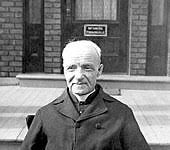A few weeks ago I began the gargantuan task of liberating my family’s books. They were jailed several years ago when we began traveling full time. Books have to be looked after and, with the house empty ten months out of the year, they just wouldn’t be safe on their own. So we tearfully locked them up in boxes, selecting only two hundred or so of them to come exploring with us.
This year, we expect more frequent visits to the house, so the books are being freed and put back onto shelves. When the rest of my family got home, my mother took over most of the book unpacking, since I have a bad habit of reading every book that I take out of a box. The process was delayed when we had to drive all over two counties trying to find the wood to build a new bookshelf from scratch because somehow, even while packed in boxes, the books had multiplied.
With the new shelf finished, it is time to move on with the unpacking. Each of the two thousand or so books has some sort of history that goes with it. Each one of them is attached to memories about when and where it was read for the first time. Eggbert: the Slightly Cracked Egg was a Christmas present. Little Icicle was the first book that I bought for myself. I broke my arm two chapters into The Return of the King when I was twelve and couldn’t hold the cover open to finish it. Little Women is particularly special because it was the first book that I really, really got into, way back when I was four or five and my mother read it aloud to my sisters and me. There were four of us, and our personalities roughly matched the girls in the story, so it was pretty easy to connect with them.
I especially remember gathering around my mom along with my sisters in the cold of winter, a fire crackling beside us, listening to my mother read Mr. March’s letter to his family. And then I remember that that is absolutely impossible. For one thing, there cannot have been a fire, because we didn’t have a fireplace. It may have been winter, but it might also have been in the summer. We might have been gathered sweetly at our mother’s feet, but it is far more likely that we were sitting on Mom’s lap, or piled on the sofa. The scene that I remember is taken directly from the story and mentally photoshopped into reality.
The fact that my mind has doctored this image into something that only sort of happened is only a little surprising. Memories are notoriously changeable, I was very little, and I was deeply influenced by the book that I was listening to.
Books are powerful things. They have the ability to change the way we think. They tell a story and the story changes the way that we relate to the people around us. It is only natural to identify with the characters in a story, to see the world through their eyes. In reading a book, we open ourselves to new ideas. This can be a very good thing. Reading about the history of the world can help us avoid yesteryear’s mistakes. Reading fairy tales teaches us that dragons can be defeated. Novels help us gain insights into our society.
The movie Inception states over and over again the infectious power of an idea, for good or for evil. Books are ideas incarnate and, sadly, they too have a downside. The author’s thoughts work into the reader’s mind, and those thoughts can be either constructive or destructive. For example, The Lord of the Rings trilogy, by its very nature, acknowledges the existence of a creator without ever mentioning God or religion by name. On the other hand, the characters in Christopher Paolini’s Inheritance series continually bring up the question of whether or not there could be a God or gods or any higher power. Both books tell a good story, both have heroes who defeat metaphorical or literal dragons. And yet, Tolkien’s story is innately constructive, while Paolini’s has a destructive thread woven into it. The difference appears very plainly in the heroes. Frodo never once questions the necessity, validity, or goodness of his quest, even when he doubts it is hobbitly possible. Eragon is bothered by questions and doubts about the validity of his quest throughout the entire series. Good still triumphs, evil still falls, but Frodo and his companions are fighting for the sake of all that is good while Eragon is fighting for the lesser evil.
It would be virtually impossible and fairly senseless to avoid every single book that has a negative aspect. However, it is important to be aware of the effects that even small downsides can have. In C.S. Lewis’s The Voyage of the Dawn Treader, Eustace Clarence Scrubb (who almost deserved his name) is pretty thoroughly described with the simple observation that he only read the wrong books. He is completely unequipped for his first journey in Narnia because he has only read books that assured him that such events were impossible.
In Eustace’s case, reading the wrong books meant he was ill adapted to face Narnia. In real life, reading the wrong books means that we are ill adapted to face Truth. As the world relies more on science than religion, as prince charming is replaced with the ubiquitous jerk, as history becomes more and more subjective, and authors spout politically correct nonsense, books that embrace the age old duty of stories to reflect Truth, Beauty, and Goodness are few and far between. It is easy to accept books that are just good enough. Instead of truth, we get books filled with scientific facts, half truths, amoral or immoral babble, and rewritten history. We accept these substitutes because they are all we can find, but they do not satisfy any hunger for truth.
Books have the ability to suck us in, make us believe in magic, and change the way we look at our lives. They can lift us up, drag us down, fill us with hope, or undermine our faith. Because of the power that books have, it is important to acknowledge that they need to be based in truth, and it is equally important to recognize that many books which contain entertaining, pleasant, and thought-provoking stories fail in this regard.









